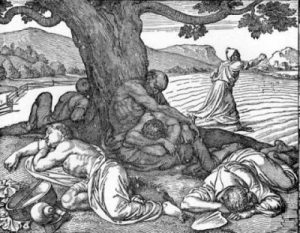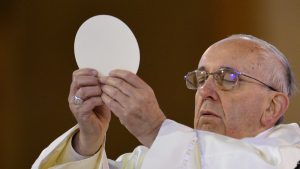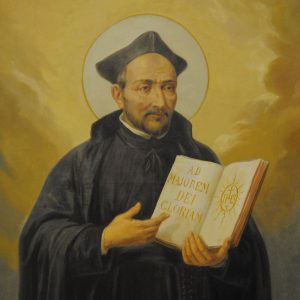Jesus wants to strengthen our faith today because some of us are in danger of losing it; others are in danger of having it weakened. One common temptation against faith is when we learn about or experience the sins of other Catholics: popes have done horrible things, bishops have covered up sexual abuse, priests are mean, “No one cares about me at my parish,” etc.
I foreshadowed three years ago that, at some point, I would hurt you; do you remember that? It hasn’t been on purpose but it was bound to happen because I’m a sinner; I make mistakes and I’m sorry about this. I always regret hurting people, and I try to repent and do better. And if I haven’t hurt you, someone else here has. And if no one has, stay around long enough, someone will!
When people get hurt, some lose faith entirely, some leave the Church, while others get discouraged. Wouldn’t it be great if we had such a strong faith that nothing anyone did here could weaken it?
 Jesus today gives us a parable that helps us understand why there are so many bad things happening in the Church. He says, “The kingdom of heaven may be compared to someone who sowed good seed in his field; but while everybody was asleep, an enemy came and sowed weeds among the wheat, and then went away. So when the plants came up and bore grain, then the weeds appeared as well” (Mt 13:24-26). He explains that “the one who sows the good seed is the Son of Man… the good seed are the children of the kingdom; the weeds are the children of the evil one, and the enemy who sowed them is the devil” (Mt 13:38-39). It’s clear from this parable that the kingdom of heaven has good people in it and bad people. The Catholic Church has saints and sinners in her.
Jesus today gives us a parable that helps us understand why there are so many bad things happening in the Church. He says, “The kingdom of heaven may be compared to someone who sowed good seed in his field; but while everybody was asleep, an enemy came and sowed weeds among the wheat, and then went away. So when the plants came up and bore grain, then the weeds appeared as well” (Mt 13:24-26). He explains that “the one who sows the good seed is the Son of Man… the good seed are the children of the kingdom; the weeds are the children of the evil one, and the enemy who sowed them is the devil” (Mt 13:38-39). It’s clear from this parable that the kingdom of heaven has good people in it and bad people. The Catholic Church has saints and sinners in her.
But, why are there sinners in her? If they’re following Jesus, shouldn’t they be better? Yes, but people enter the Church with all their brokenness, wounds, and sins, and it takes a long time to overcome them and become like Jesus. The Church is not a museum for saints; it’s a hospital for sinners. What do we find in hospitals? Illness, disease, cancer, anger, grief, etc.
People in the Church should be better, but they don’t take the medicine God gives. They may buy it, but it just stays on the shelf. Every Catholic is directed by the Doctor to eat spiritually once a week, right (Eucharist)? How many do that? If they don’t, it’s no wonder they’re not spiritually nourished. Sometimes those who eat don’t follow all of the Doctor’s prescription, i.e., all of Jesus’ philosophical, theological and moral teachings. (If the world did, there’d be no moral problems.) The Doctor recommends going for a check-up once a month (Reconciliation)—how many do that? He also recommends daily strength training of virtue, character and discipline and daily consultations with Him (prayer).
When the slaves in the parable ask the master, “Do you want us to go and gather them?” he answers, “No, for in gathering the weeds you would uproot the wheat along with them” (Mt 13:28-29). While it’s true that the Church has to discipline Catholics for a very few serious sins (Code of Canon Law, cc. 1311-12, 1314, 1331), God never kicks out anyone from the Church because that would mean everyone would be kicked out! He leaves people inside her in order to call them to repentance and give them a chance to change. As the Psalm today says, God “is slow to anger and abounding in steadfast love” (Ps. 86).
During the Last Supper, Jesus said to St. Peter, “Simon, Simon, Satan demanded to have you, that he might sift you like wheat, but I have prayed for you that your faith may not fail” (Lk 22:31-32). The devil is real, and he wants all of us to lose faith. But Jesus, our high priest, is praying for us to the Father, that our faith may not fail.
I’d like to suggest two ways of cooperating with Jesus so that our faith stays strong: 1) What we just talked about: Once we understand that the Church is a hospital for sinners, that even priests are sinners, then our expectations are realistic and we won’t be shocked; we’ll be saddened, disappointed, and justly angry, but never discouraged enough to leave the Church, our family.
 2) If we’re in the field where we see many bad weeds among the good plants, we have to train ourselves to look at the Sower. We have to keep our eyes on Christ, not other people! Do you remember the incident when the disciples were in the boat, and Jesus came to them walking on water (Mt 14:25-34)? When St. Peter started walking on the water too, he started to sink when he took his eyes off Jesus and looked at the wind (Mt 14:30). So, we too have to keep our eyes on Jesus, even when there are winds in the Church.
2) If we’re in the field where we see many bad weeds among the good plants, we have to train ourselves to look at the Sower. We have to keep our eyes on Christ, not other people! Do you remember the incident when the disciples were in the boat, and Jesus came to them walking on water (Mt 14:25-34)? When St. Peter started walking on the water too, he started to sink when he took his eyes off Jesus and looked at the wind (Mt 14:30). So, we too have to keep our eyes on Jesus, even when there are winds in the Church.
The Catholic Church is not just an organization; it is not just an institution. St. Paul teaches that she is the body of Christ (Cf. 1 Cor 12:12-31; Col 1:18; 2:18-20; Eph. 1:22-23; 3:19; 4:13). Think about Jesus’ words to St. Paul on the road to Damascus. Before he was a Christian, he was persecuting the Church. And while on the road to Damascus, a light flashed about him and Jesus said to Him, “Saul, Saul, why do you persecute Me?” Not, “Why do you persecute those Christians?” or “Why do you persecute that religious institution?” but “Me.” St. Paul then said to Him, “Who are you, Lord?” “I am Jesus, whom you are persecuting.” But how could it be Jesus—He had already gone up to heaven? Because the Church is His body.
Because of this truth, it’s always important to cut fine distinctions: The Church is holy, but her members are sinful. So it’s not correct to say “The Church is sinful;” she’s not, her members are. The Church is holy. Why? Because she’s the body of Christ. Knowing this, is it fair to say the Church has problems? Yes, because she has you and me. Is the Church man-made? No, because Jesus made her. Though she does have many man-made elements in her. Is the Church an institution? Yes, but it’s more precise to say in a secondary way. She’s primarily the body of Christ. That’s the only way we can explain why the Church has survived so many years as an institution, in spite of all the immoral priests and bishops, and all the mismanagement. No merely human organization run this badly could have survived. An atheist communist once threatened a bishop, “We’re going to destroy your church!” And he responded, “Good luck! We’ve been trying to for 2,000 years and still haven’t done it.”
So how do we keep our eyes on the Head of the body? The Eucharist. The Eucharist is Jesus Himself. The devil knows this all too well: he wants us to get so turned off that we stop coming to Mass, that we’ll skip our daily Mass, or be so frustrated that we stop coming to the chapel. Once we move away from the Eucharist, we’ll move away from Jesus. Now, when some leave the Church, they argue, “I didn’t lose faith in Jesus, just in the Church.” To this we should very gently respond, “If you loved Jesus, you’d read His book (the Bible), which says the Church is His body. If you loved Jesus, you’d love the Eucharist, which He said is Himself.
St. Ignatius of Loyola, in his 6th rule of discernment, gives great advice whenever we’re tempted. This advice is called ‘act against,’ or in Latin, ‘Agere Contra.’ Whenever the devil tempts us to go in one direction, do the exact opposite! So, whenever we’re feeling really down and just don’t want to pray, what do we do? Pray! Whenever we feel like we don’t want to go to Church, we should go to Church. If we make such an act of faith and come to Mass, and if we do so with an open heart, like we said last week, then we’ll allow the Holy Spirit to fill us with all He wants to give us.
Most importantly, I’d like to invite everyone today, if we feel ready, to make a decision in our hearts to never leave Jesus and the Eucharist. This is something we can do right now, or during the Mass; it’s especially appropriate when we receive Communion. Here’s a prayer we might say: “Jesus, thank You for coming to me in the Eucharist. Strengthen my faith in You. Help me to cling to You when people disappoint me. Even when other Catholics hurt me, I will never leave the Mass or the Eucharist. Amen.” If we’re not ready to pray this today, we might pray it another day, whenever we’re ready. Let’s pray in a particular way for our young people. If they pray a prayer like this, they’ll never fall away.
 Every saint had an incredible love for the Eucharist. That’s why, even when St. John of the Cross was thrown in prison by other priests and brothers, St. Ignatius was examined by the inquisition, St. Philip Neri had his faculties suspended by a cardinal (Fr. Vincent J. O’Malley, Ordinary Suffering of Extraordinary Saints, 125, 137), and St. Mary McKillop was excommunicated unfairly, none of them left the Church. They never wanted to absent themselves from the Eucharist, which is Jesus. I hope we all have a faith like that!
Every saint had an incredible love for the Eucharist. That’s why, even when St. John of the Cross was thrown in prison by other priests and brothers, St. Ignatius was examined by the inquisition, St. Philip Neri had his faculties suspended by a cardinal (Fr. Vincent J. O’Malley, Ordinary Suffering of Extraordinary Saints, 125, 137), and St. Mary McKillop was excommunicated unfairly, none of them left the Church. They never wanted to absent themselves from the Eucharist, which is Jesus. I hope we all have a faith like that!
Don’t look at the weeds, look at the Sower. Cling to Jesus, cling to the Eucharist.

